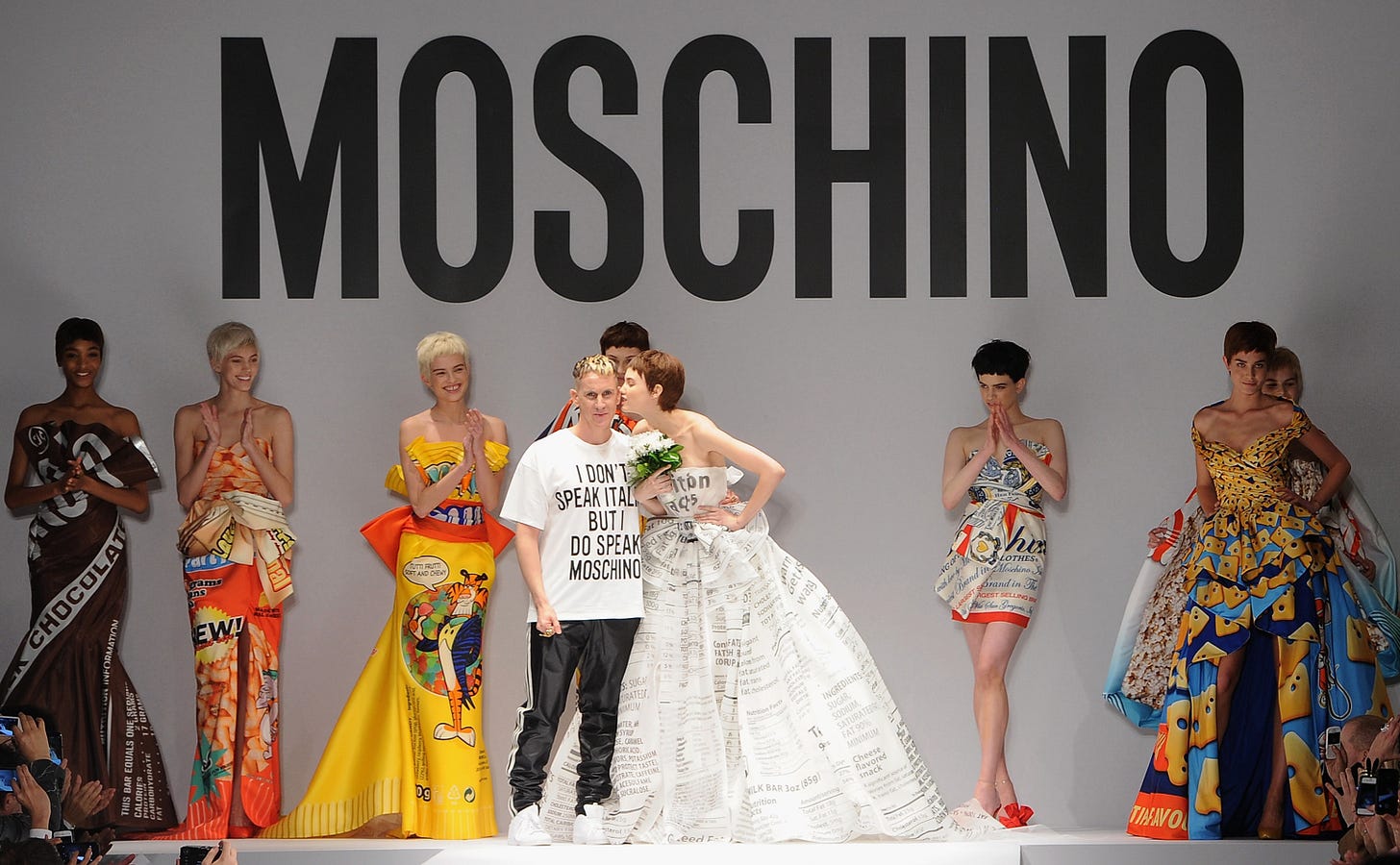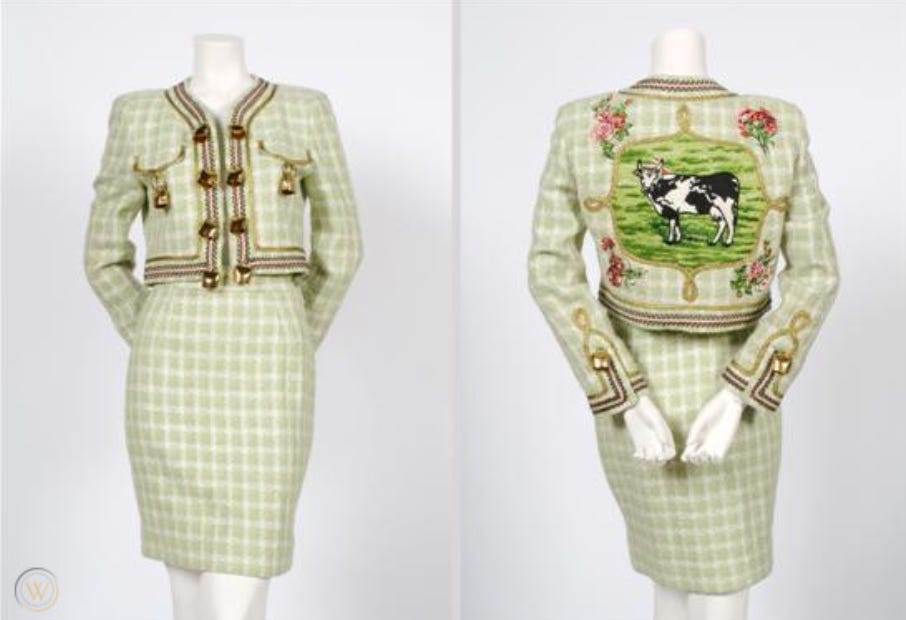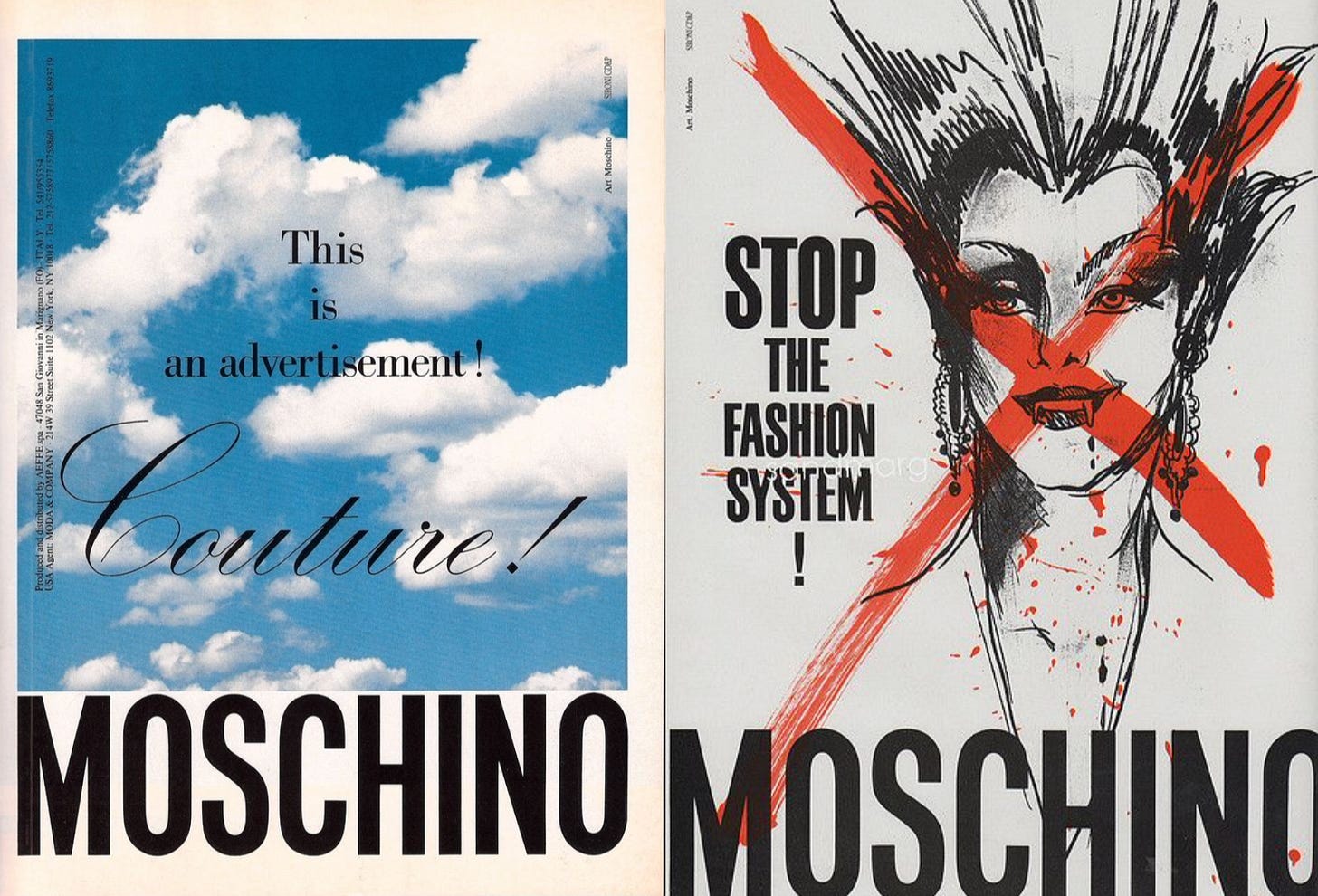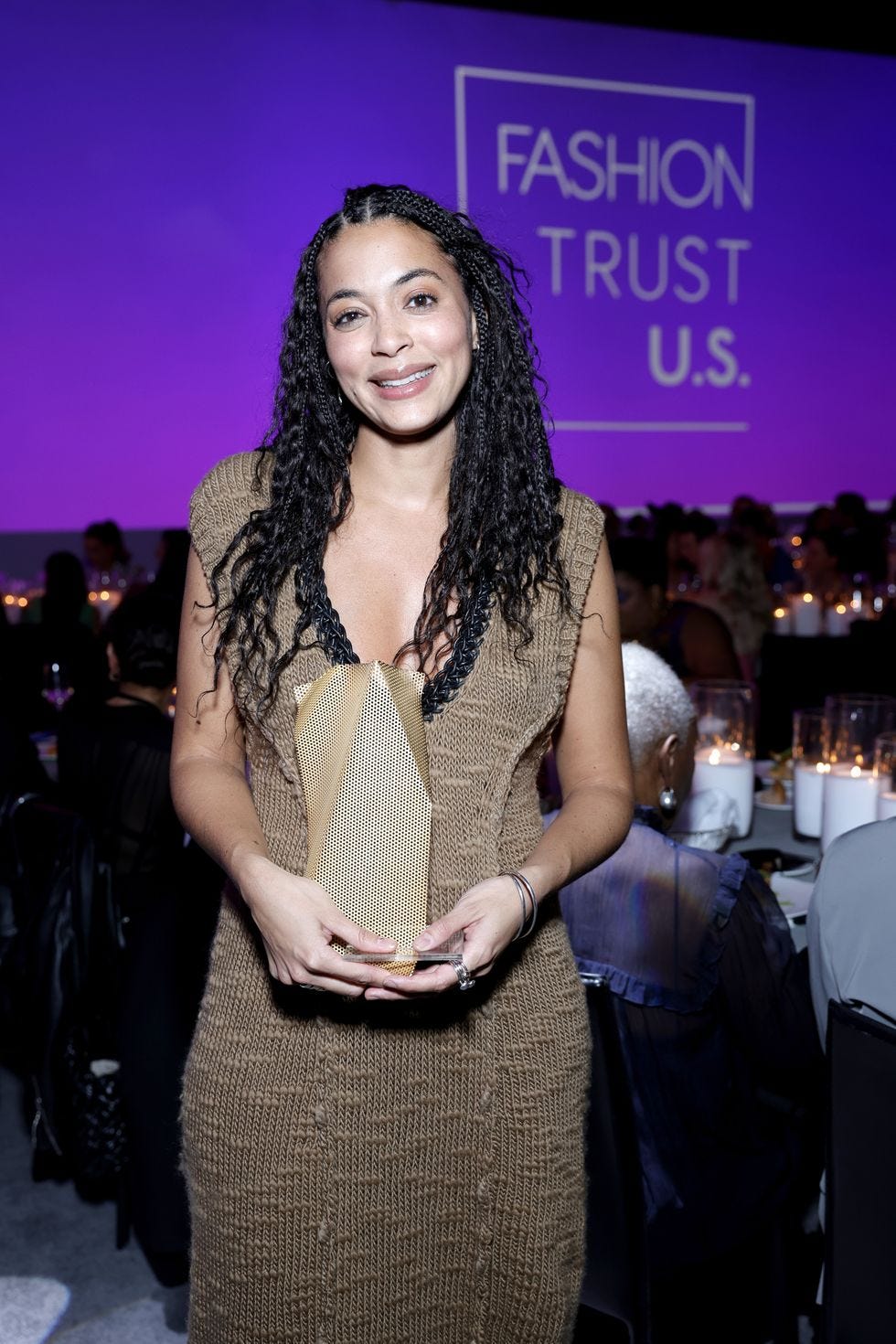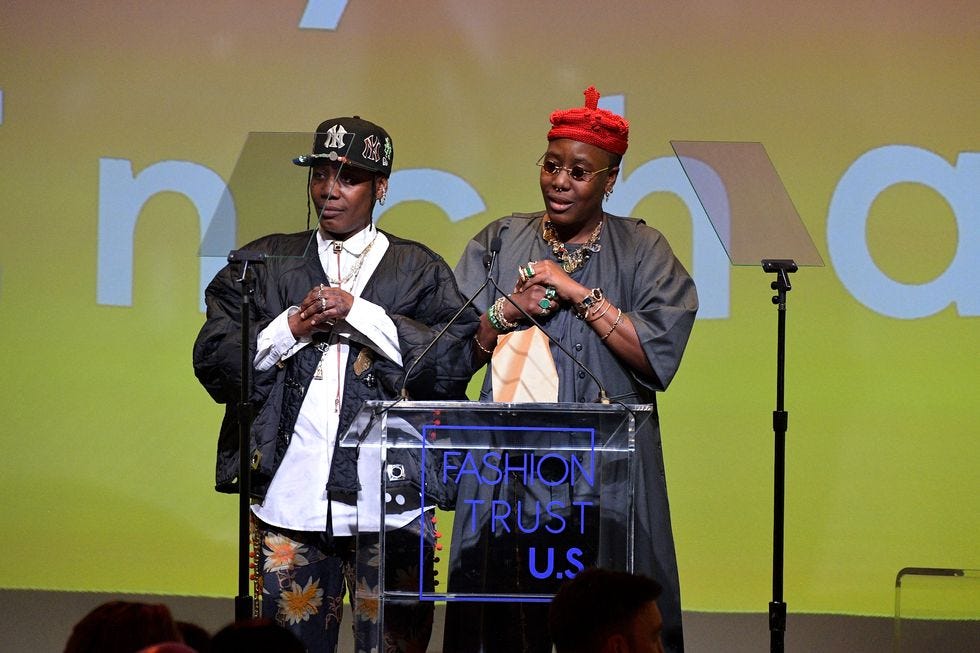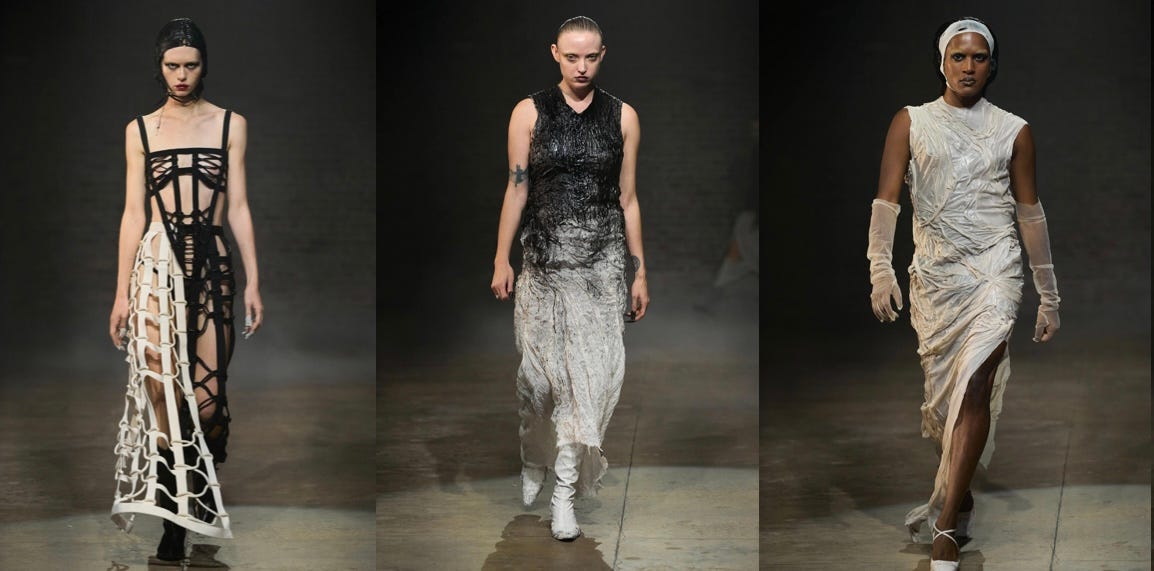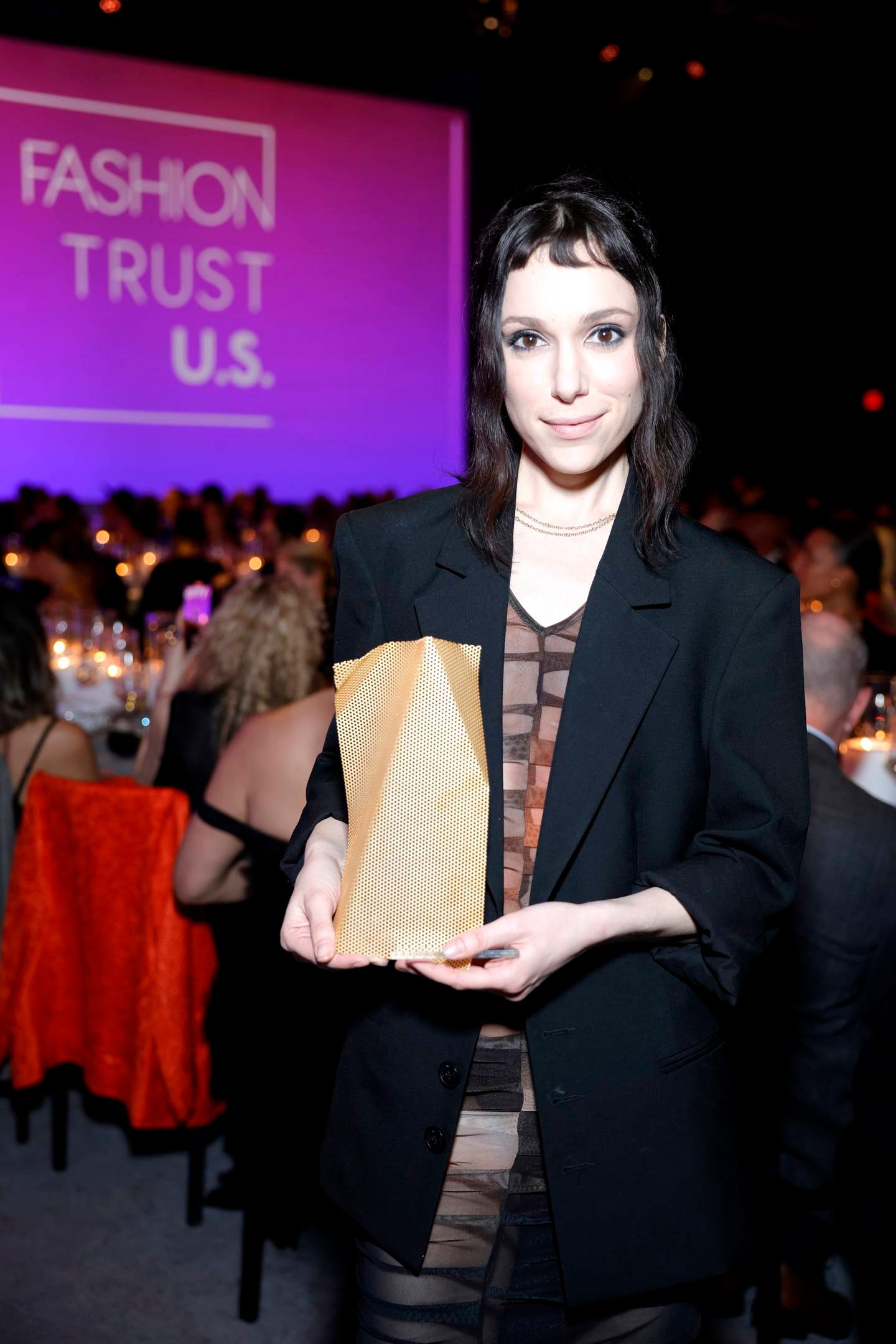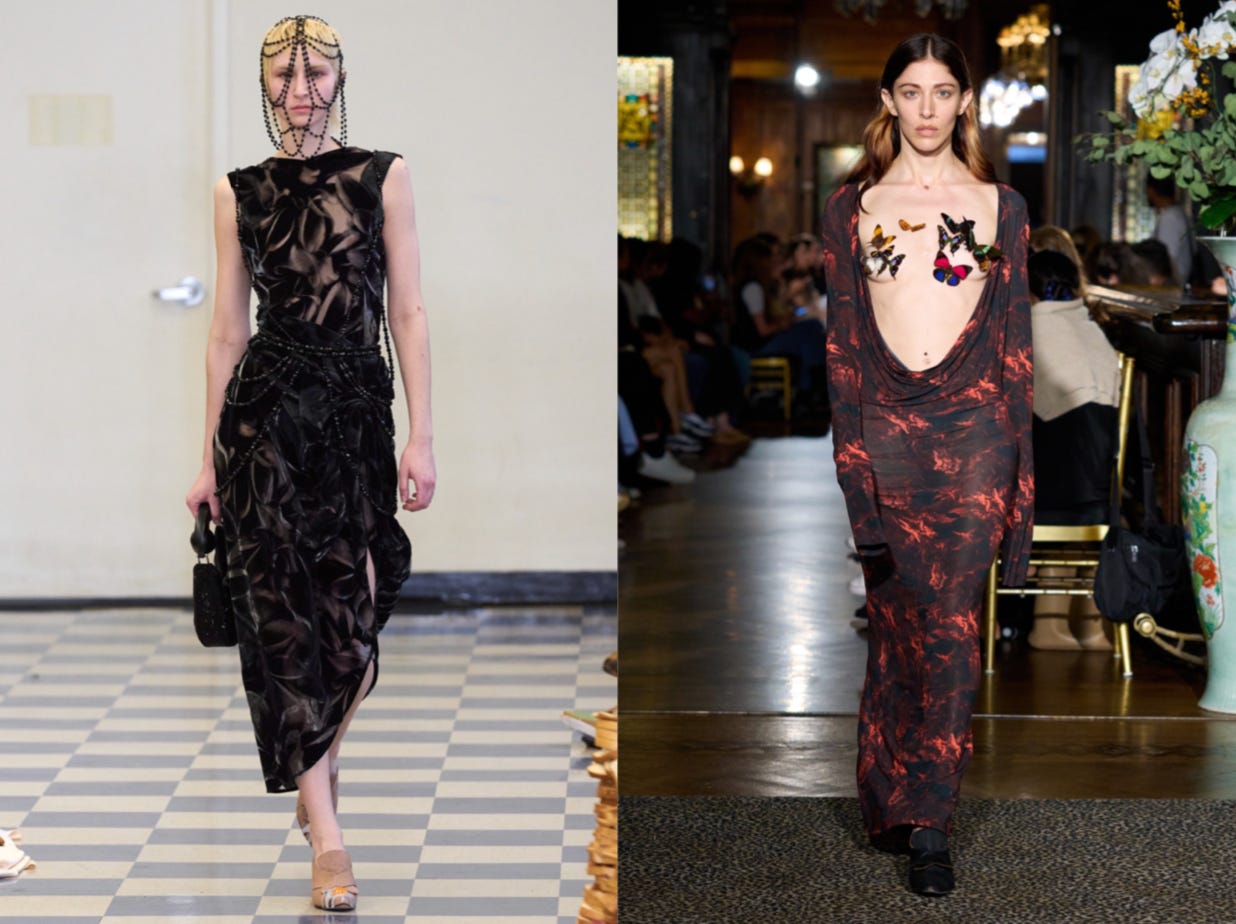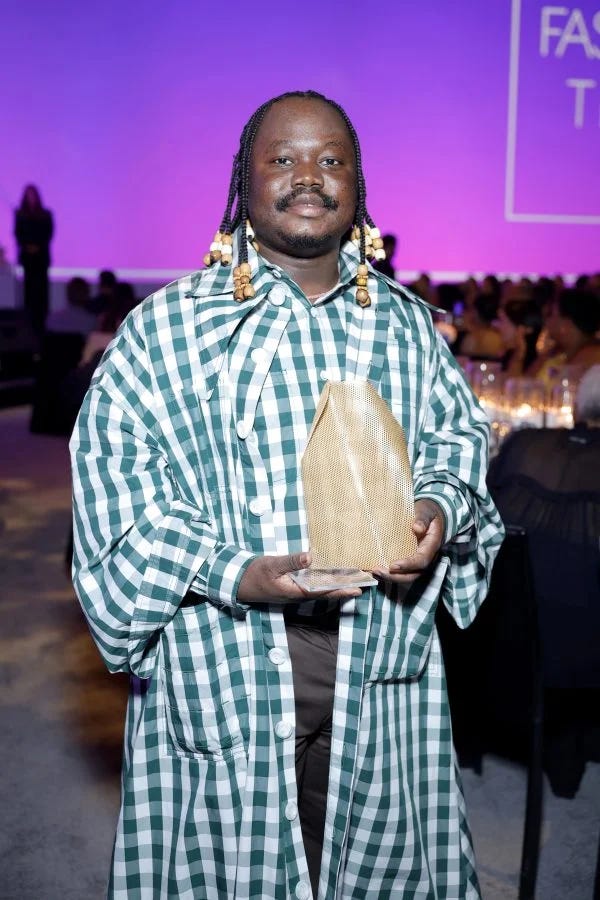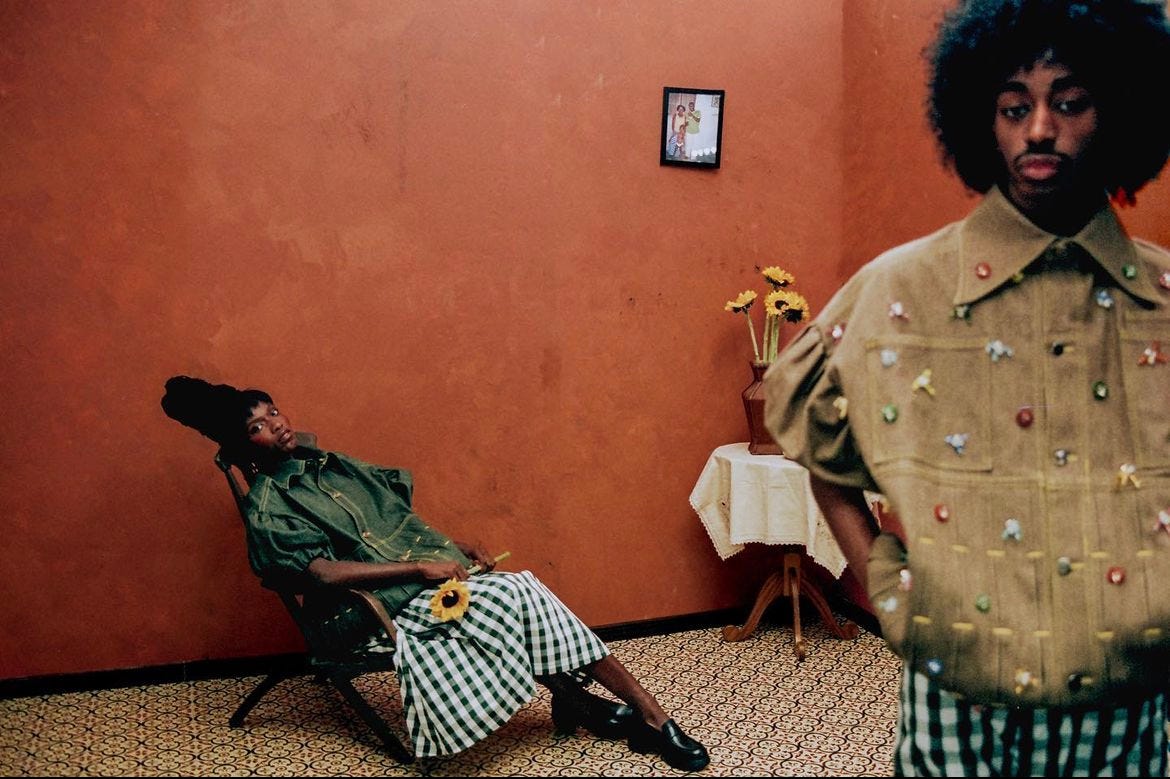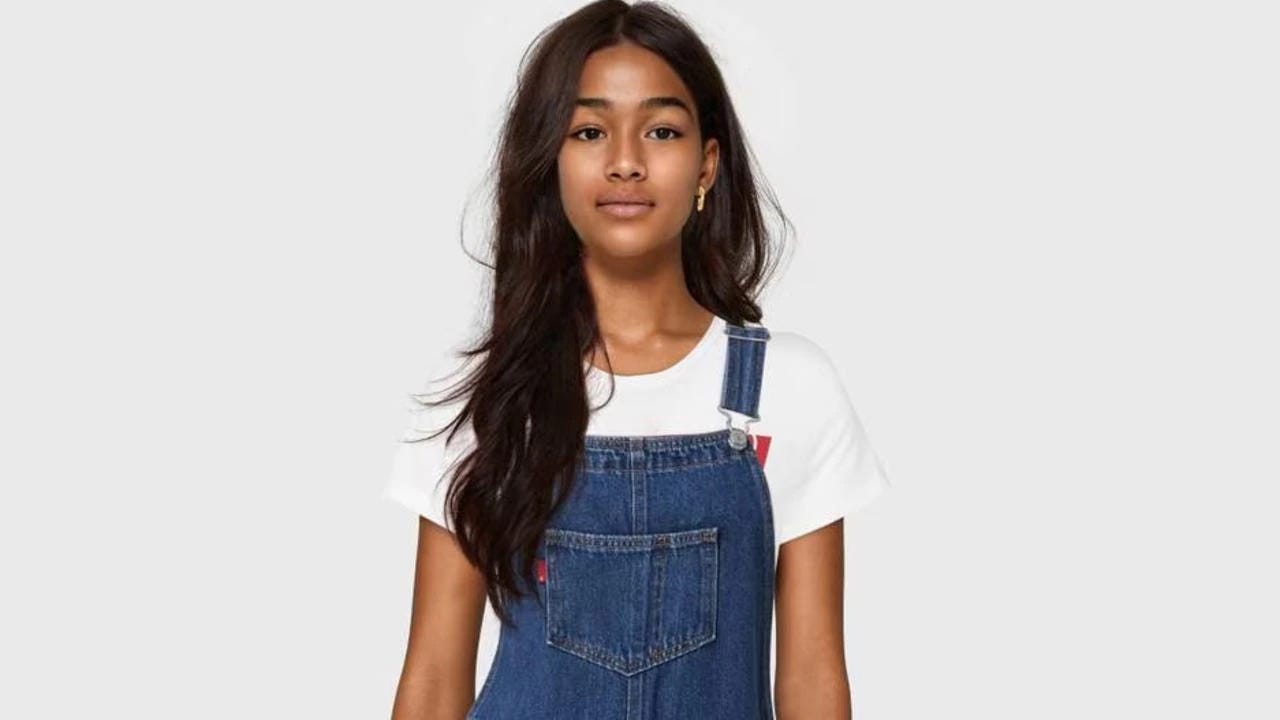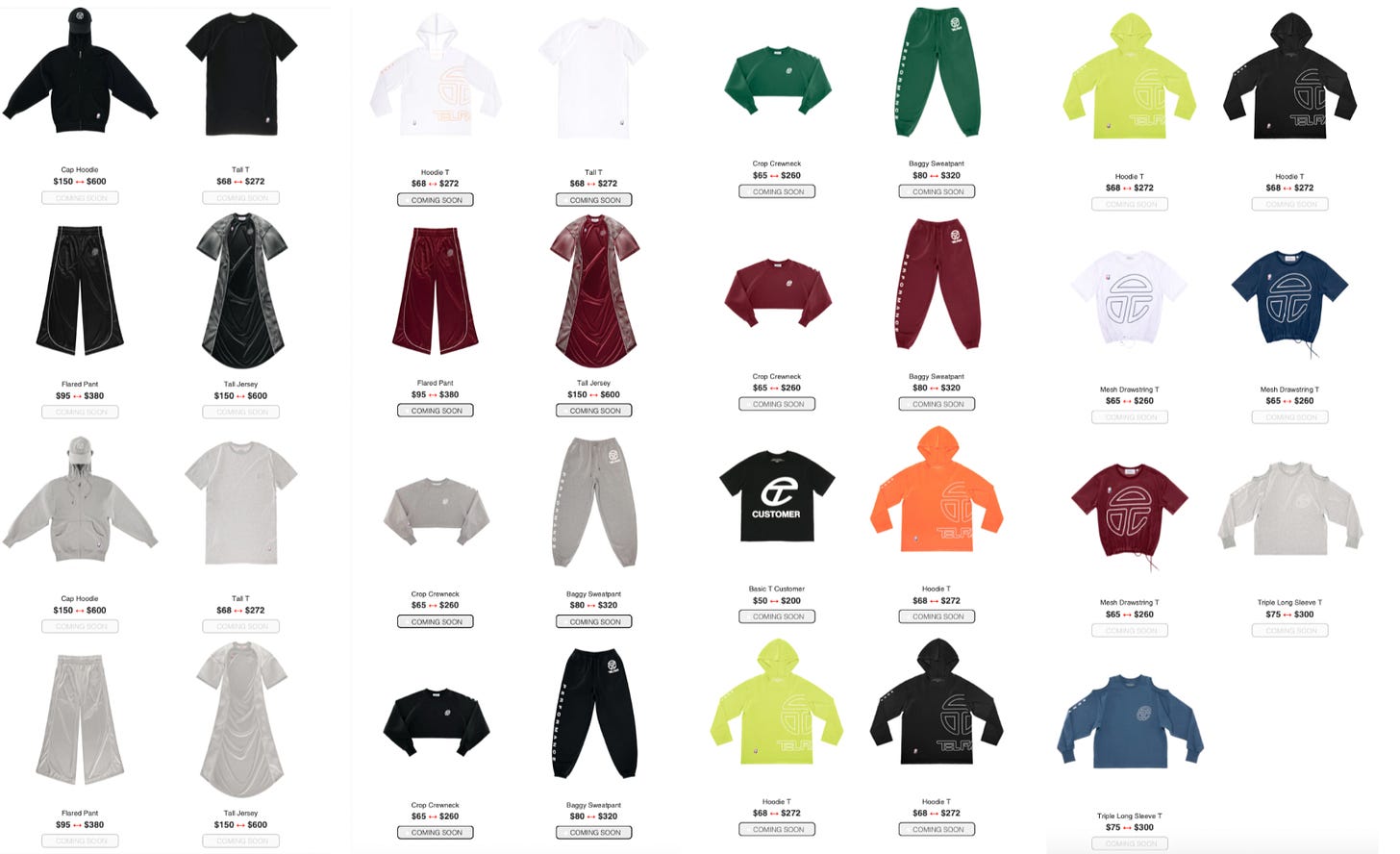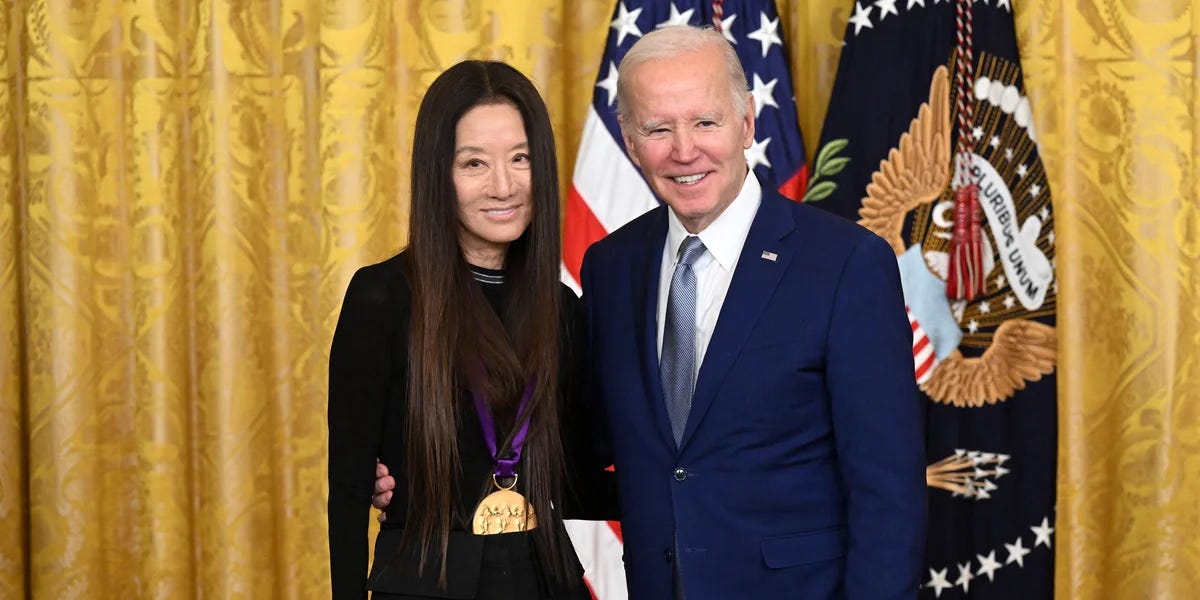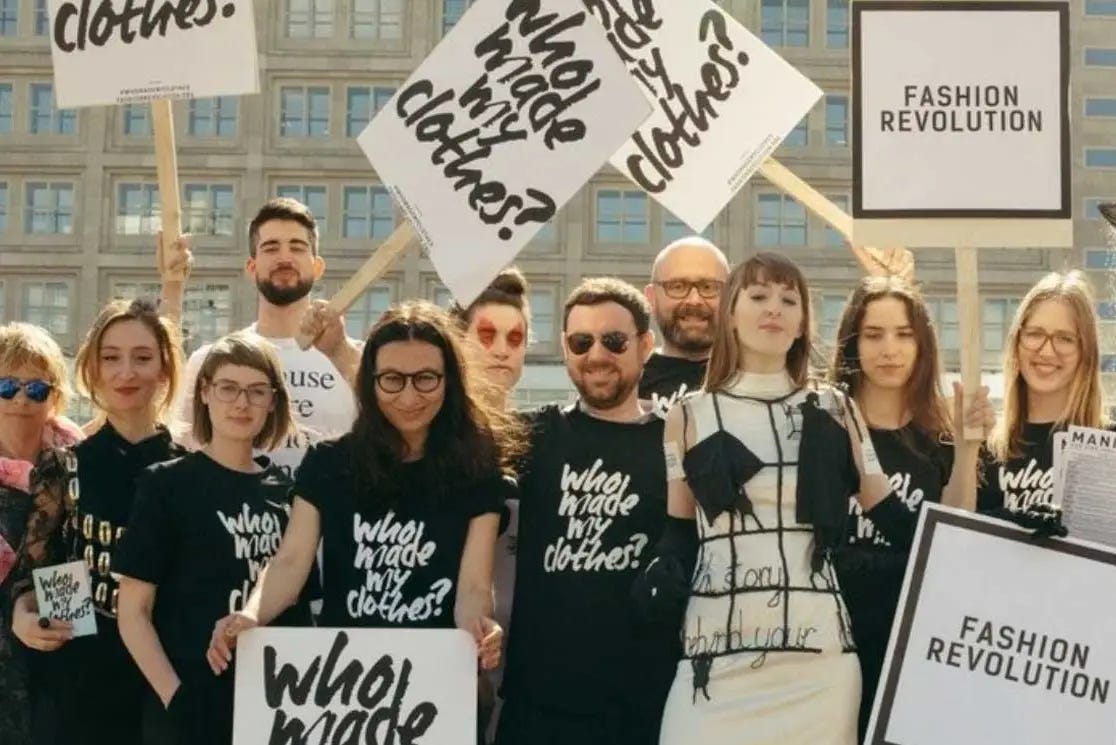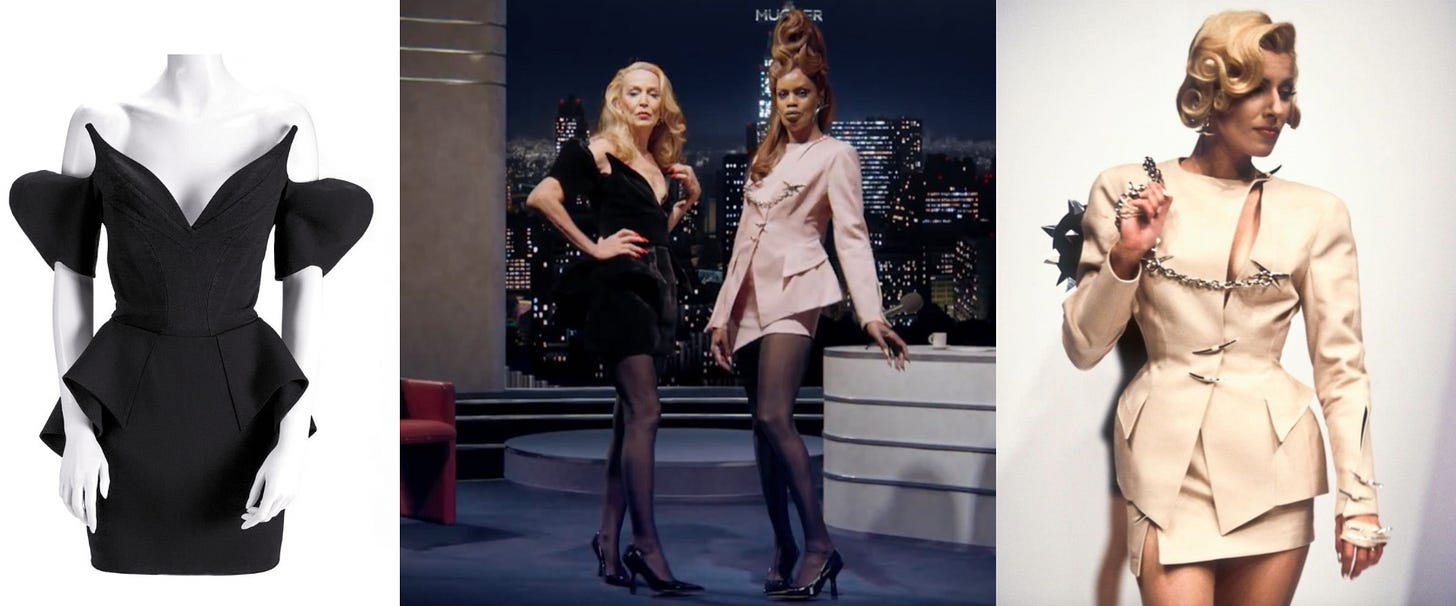Definitely one of the plus-sides to having a Substack is the ability to resist fast-pace & quota-meeting journalism. I, for one, am a huge proponent of slow journalism and taking the time to fully process information, so I can meaningfully address it (I’m still writing about Milan and Paris Fashion Week lol). However, I still think Being in the Know is important to understanding the industry at large and, since I started this Substack with fashion democratization in mind, I want to try my best to deliver on that too! So I want to test run a weekly fashion round-up where I summarize the week’s news and also give a few article recommendations to go with it. :)
Jeremy Scott Leaves Moschino :
After 10 years as creative director, Jeremy Scott decides to part ways with Moschino. In an interview with Farah Fluerima for The New York Times, Scott explains that this split was amicable and just simply time to move on to a new project. Although that new project is not yet known, Scott is currently in Seoul, South Korea working on a collaboration with Hyundai Motor Company. Inspired by Hyundai’s Re:Style initiative, which promises to recycle Hyundai interiors, Scott will be unveiling a collection made from recycled car parts and upholstery on March 23 at AP Again, in Seongsu-dong, Seoul. The exhibit will run until April 9, 2023.
Moschino was founded in 1983, meaning their 40th anniversary is this year. The brand’s first decade was operated by, the founder and namesake, Franco Moschino. Franco Moschino was notorious for his witty and satirical designs that challenged the fashion hierarchy by parodying other luxury brands through his Couture! and Cheap and Chic lines.
“Fashion is absolutely tacky. Being fashionable is not positive at all. Fashion is over. Let’s talk about something worthwhile. Fashion kills people. It is Fascism. As a designer, I have to convince you to change–to cut your hair, to change the frames of your glasses. You’re a creature of the fashion system, a Muppet, not yourself,” - Franco Moschino, New York Magazine, 1989.
Franco Moschino sadly passed away in 1994 after fighting AIDS for several years which means his time as creative director at Moschino lasted a little over 10 years. For this reason, I think Jeremy Scott’s departure after a decade with the brand is appropriately timed. Scott managed to revive Moschino and carry on Franco’s legacy by sticking to the founder’s original brand identity — something that is not to common amongst heritage houses. I hope the same can be said for Moschino’s next creative director and I’m excited to see what is in store for the brand moving forward.
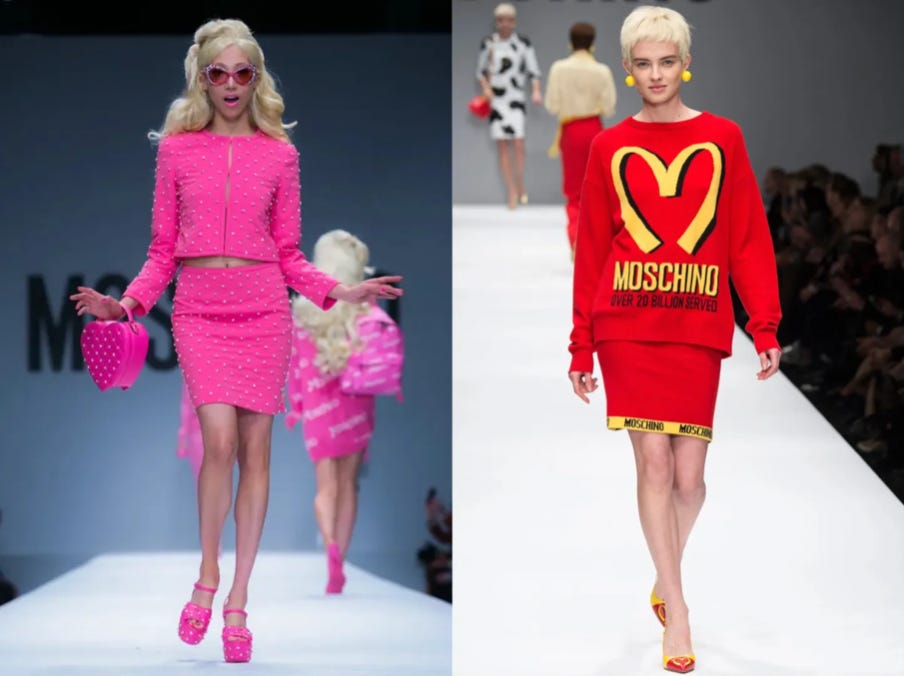
Balenciaga Profile in The New Yorker :
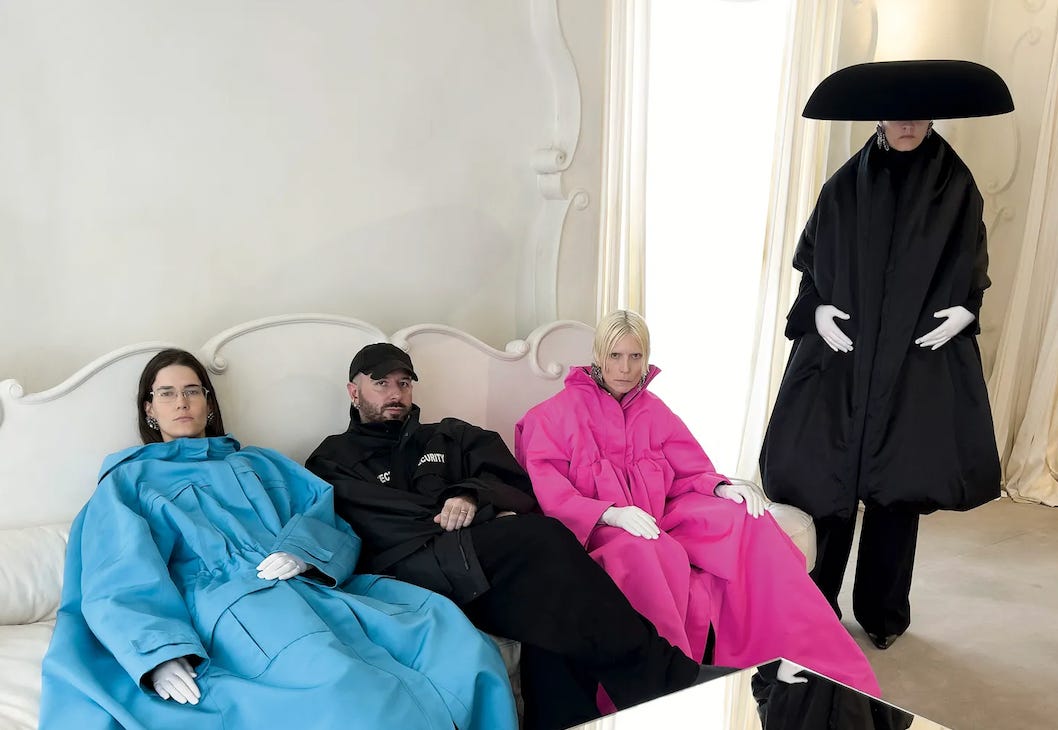
Demna’s Balenciaga was discussed at length by Laura Reilly for an article in The New Yorker. Nothing in this profile was new information, however it did compile Demna’s personal history, design career, and controversies as well as provide and overview on Balenciaga’s entire brand history.
The main discussion at hand was, of course, the controversial Balenciaga campaign from November 2022 that photographed children holding inappropriate merchandise, but it did extend much further than that one topic. This article did slant in favor of Demna, sometimes obnoxiously so. I tend to slant out of favor of Demna, sometimes obnoxiously so, so here is what I agree and disagree with:
Disagree :
- The article opened with immense praise of Demna, citing quotes like “Demna’s the only one who talks about the things we’re all thinking about” and “[While] other designers take us to the Qing dynasty or the Belle Époque, to Djuna Barnes’s Left Bank flat or Talitha Getty’s Marrakesh villa. Demna had been willing to take us there” while (ironically) simultaneously calling all other designers and brands “pretentious.”
Demna is not immune to pretension, in fact, he perpetuates it. I wrote an essay a few weeks ago on the fashion industry’s glamorization of poverty that you can read here, but to summarize, Demna has a long history of “critiquing capitalism” by selling luxury goods that resemble clothing of the lower class and/or unhoused. Profiting on the less-than-fortunate living situations of those living in poverty isn’t a “critique on capitalism” it is, by definition, just capitalism. Any pseudo-intellectual description you attach to justify the designs will read as nothing less than pretentious.
- I also think it is in poor taste to open an article with praise for a designer when a large reason why he is being discussed at length is for potential child endangerment. Whether you believe it to be true or not, it does not compel you to take this situation seriously and, again, whether you believe it to be true or not, any discussion of potential child endangerment needs to be carefully handled.
Agree :
- Although I think the ad is a cause for concern, I do agree that the situation was manipulated to feed dangerous conspiracy theories and weaponized by right-wing media to aid their own unrelated narratives. Again, this is another situation of a child endangerment discussion being inappropriately handled.
Fashion Trust U.S. Awards :
The Fashion Trust U.S. awards were on March 21 at Goya Studios in Los Angeles, California. The Fashion Trust U.S. is a non-profit initiative dedicated to discovering and funding young designers. Winners of the awards are given financial grants and mentorships to aid them in building their own successful brands.
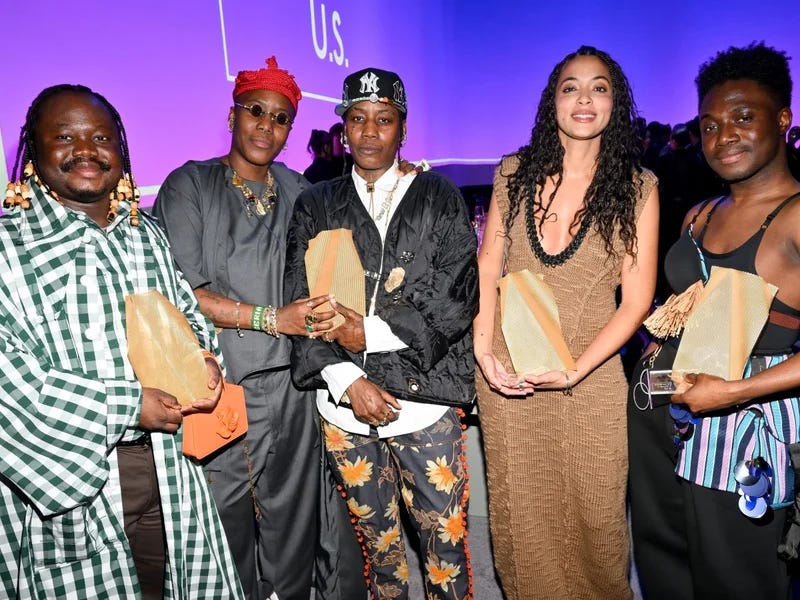
The awards and 2023 recipients are as follows:
The St. John Knits Ready-To-Wear Award: Aisling Camps
Aisling Camps is a Trinidadian mechanical engineer-turned-knitwear designer. She initially graduated from Columbia University, but later pursued a second degree from the Fashion Institute of Technology where she developed her skills in knitwear design. She operates her namesake brand out of Brooklyn, New York where all of her pieces are made by hand or outsourced from Emilia-Romagna, Italy from a family-run business with three generations of knitwear experience.
Since she is a Trinidad native who grew up in the Port of Spain, Camps says she naturally leans towards beachy designs. Her eponymous brand is self-described as “Regal, Minimalist, Caribbean, and Modern.”
Aisling Camps is the 2023 winner of the St. John Knits Ready-to-Wear Award. This award consists of a $150,000 grant, an opportunity to collaborate with the St. John Knits design team, as well as mentoring and business development advice from their global CEO, Andy Lew, and the FTUS advisory board which is made up of 19 industry professionals such as Law Roach and Gabriella Karefa-Johnson.
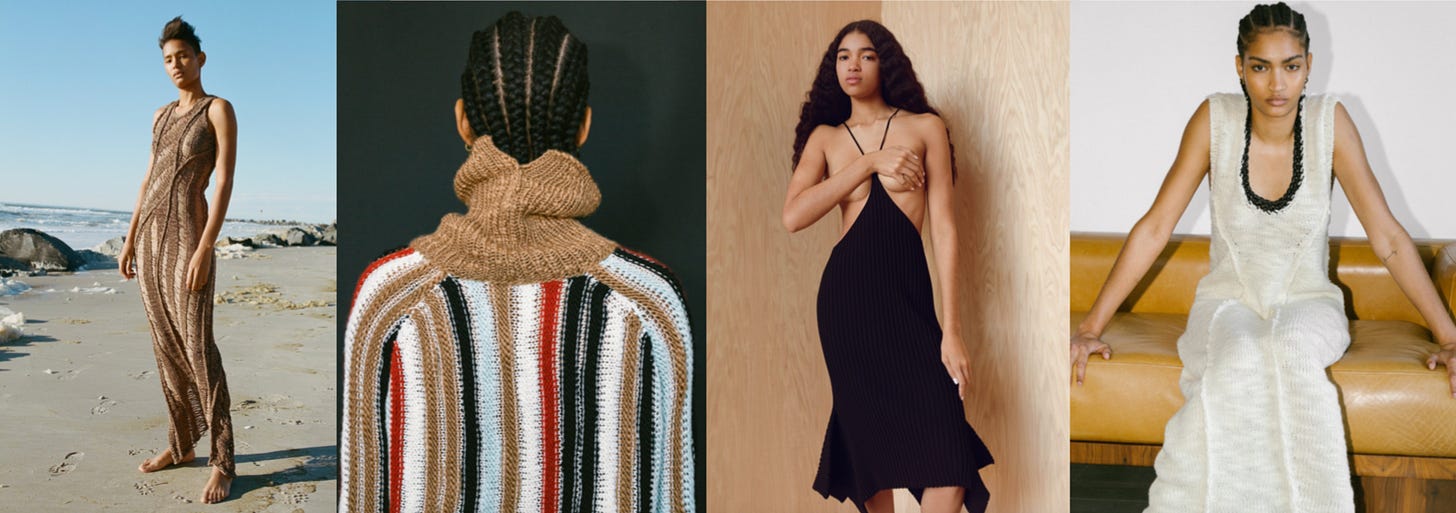
The Jewelry Award: L’Enchanteur
L’Enchanteur is a Brooklyn-based brand co-founded by Nigerian-Dominican twins Dynasty and Soull Ogun. Their brand is heavily influenced by spirituality. The elements, numerology, mythology, religion, magic, and folklore are all common themes amongst their designs. The Ogun twins have previously worked with 3.1 Philip Lim and have dressed celebrities such as Megan thee Stallion, Lauryn Hill, and Erykah Badu as well as designed the jewelry for Beyoncé’s Black is King.

Although the specialize in many areas of design, they specifically won the 2023 FTUS Jewelry Award. The design duo will receive a grant of a $25,000 as well as mentoring and business development advise from the Fashion Trust U.S. advisory board.
The Sustainability Award: Elena Velez
Elena Velez is a New York City-based designer from Milwaukee, Wisconsin. Velez is one of the most popular rising designers at the moment. She won both the CFDA Vogue Fashion Fund and the American Emerging Designer of the Year award at the 2022 CFDA Fashion Awards.
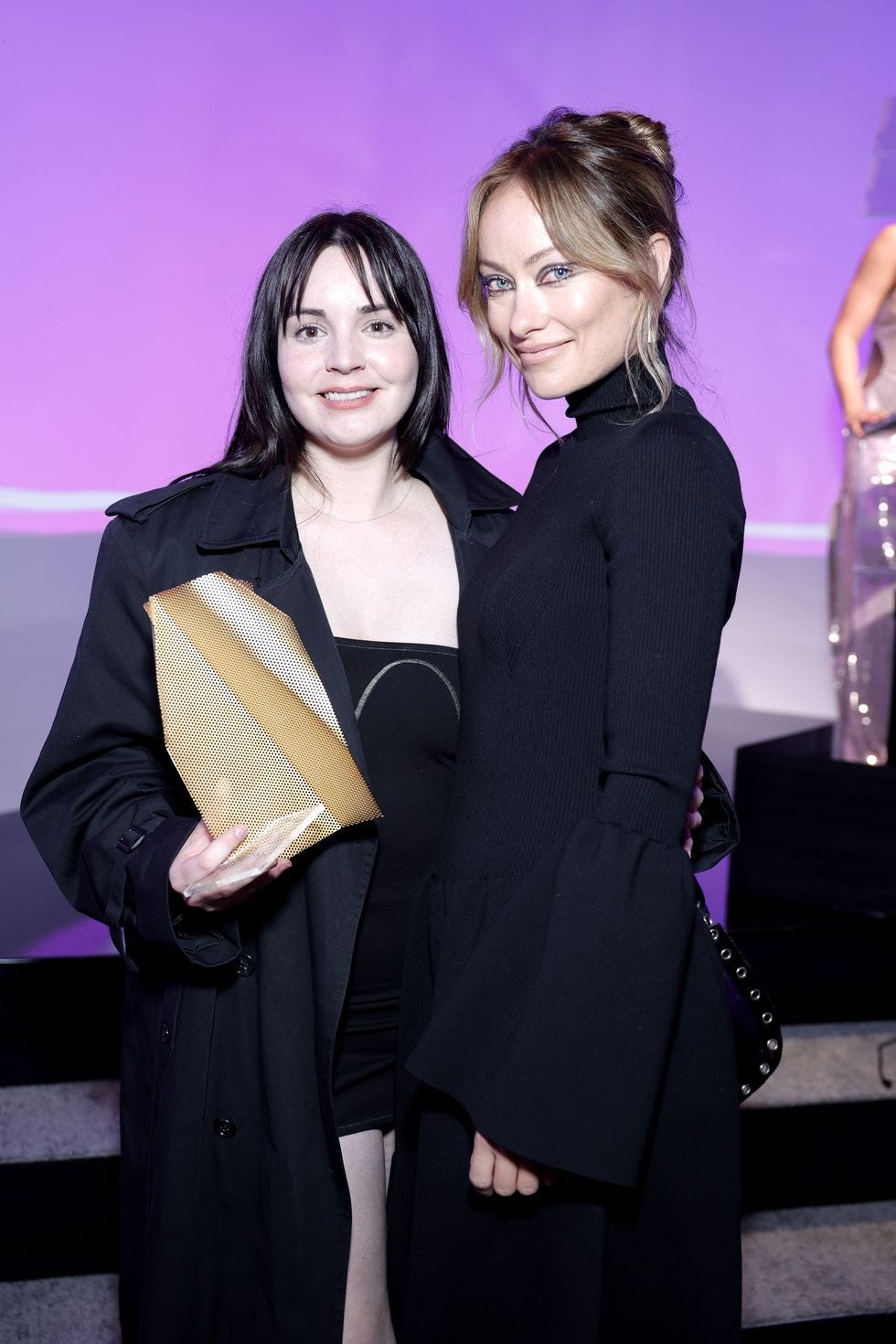
Velez’s work is heavily influenced by her Midwest blue-collar upbringing and her brand is dedicated to creating a space for the working class in high fashion. As a former metalsmith herself, Velez frequently collaborates with local artisans to amplify regional crafts through her deconstructed and industrial design style.
As the winner of the 2023 FTUS Sustainability Award, Elena Velez will receive a $25,000 grant as well as mentoring and business development advise from the FTUS advisory board.
The Creativity Award sponsored by Google: Puppets and Puppets
Puppets and Puppets is a New York City-based fashion label founded in 2018 by Carly Mark and Ayla Argentina. Argentina covers most of the garment construction while Mark operates as creative director and publicist of their brand. Carly Mark was also a nominee for the 2022 CFDA American Emerging Designer of the Year award.
As multi-talented creatives, and with Mark as the head of the docent program at the Detroit Institute of Art, it comes as no surprise that a lot of their collections are inspired by cinema and fine art. Their two most recent collections, Spring 2023 RTW and Fall 2023 RTW, were inspired by the films Eyes Wide Shut (1999) and Dead Ringers (1988), respectively.
Puppets and Puppets is the 2023 recipient of the FTUS Creativity Award. This award consists of a $25,000 grant as well as mentoring and business development advise from the Fashion Trust U.S. advisory board.
Graduate Award sponsored by Google: Papa Oppong
Papa Oppong Bediako is a New York City-based designer from Accra, Ghana. Since graduating with a MFA in Fashion Design from the Fashion Institute of Technology, Bediako has gone on to design for the West African textile company, Woodin, as well as style and direct a fashion show for Adidas (Ghana). He has also received accolades from CNN and Forbes for his work in amplifying African design, with the latter listing him as one of the 15 young African designers “re-branding the continent.”
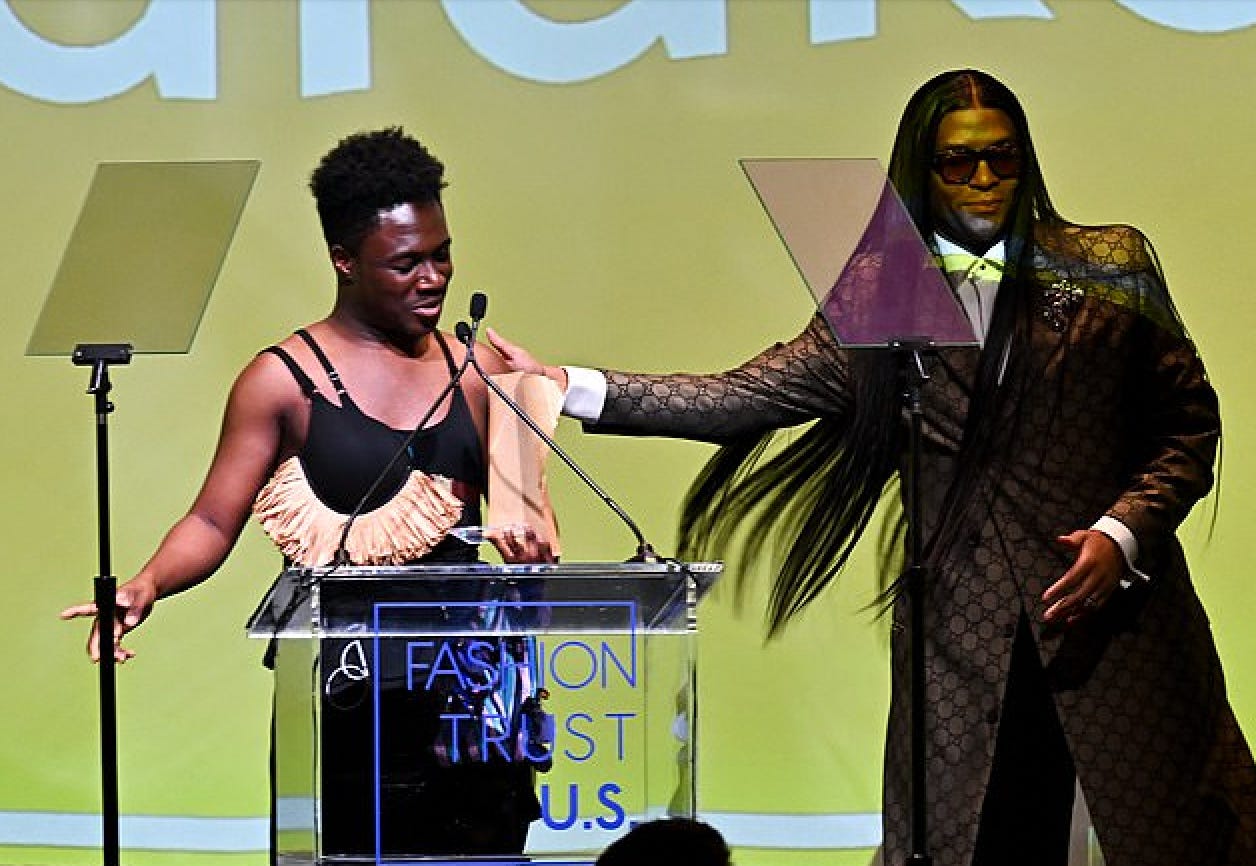
As the winner of the Graduate Award sponsored by Google, Papa Oppong will receive a $25,000 grant as well as mentoring and business development advise from the FTUS advisory board.
Inclusivity Award: Agbobly
Agbobly, formerly known as Black Boy Knits, is an eponymous brand founded by the Togolese designer Jacques Agbobly. Their designs emphasize on Black, immigrant, and queer design codes that aim to “subvert expectations for work made by African designers.” As a non-binary African designer themself, Agbobly’s explores gender nuance through fashion while blending traditional Togolese design techniques that are commonly overlooked within luxury fashion.
Jacques Agbobly is the winner of the 2023 FTUS Inclusivity Award. This award was created to recognize a brand that fosters a diverse and inclusive environment that acknowledges and utilizes individual’s talents from various backgrounds. Agbolby will receive a $25,000 grant as well as mentoring and business development advise from the Fashion Trust U.S. advisory board.
Fashion and Artificial Intelligence :
Artificial intelligence had a big influence on fashion this week…
Vogue Brasil Introduces AI Covers for the March 2023 Issue:
Six photographers and visual creatives were invited to each design a cover for the March 2023 Issue of Vogue Brasil. Although the photographers were all real, the models were not. This project aimed to open a conversation on fashion’s place in the digital world and legitimize AI, not as an alternative to traditional photography, but as an additional genre of it.
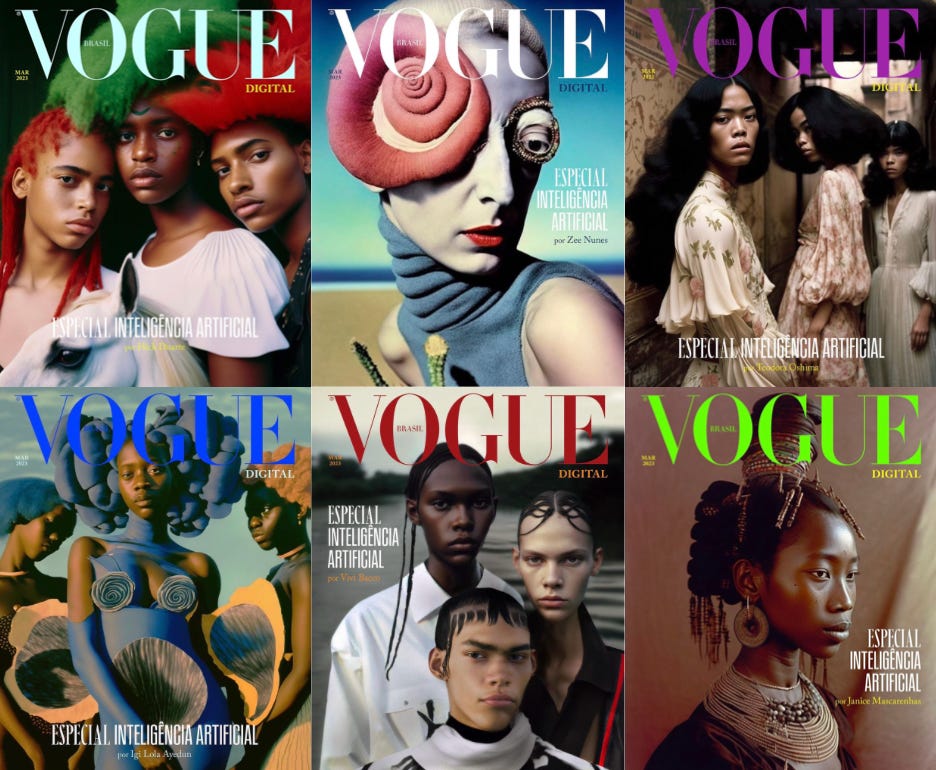
The covers were designed in an artificial intelligence program called Midjourney. This program generates images through text descriptions called “prompts.” Photographer Igi Lọ́la Ayedun writes that this project taught “how to transcribe our own ideas and imagery desires,” and that this prompt-based project was “the most difficult AI I've ever done.”
Levi’s Begins Testing AI-Generated Models:
The denim brand, Levi’s, announces they will supplement their human models with AI-generated ones later this year. This initiative is in collaboration with the Dutch digital fashion studio Lalaland.ai which apparently allows customers to see models “that look more like themselves.” This AI program claims to create “super-realistic models of every age, size, skin tone, and body type” and that this initiative offers a “more inclusive, personal, and sustainable shopping experience.”
Stradivarius AI Campaign
Colombia-based fashion brand, Stradivarius, launched their spring collection this week, not only using AI models, but also some AI clothing. As written on their website, these designs “are what our fashion would be if reality didn’t limit us.”
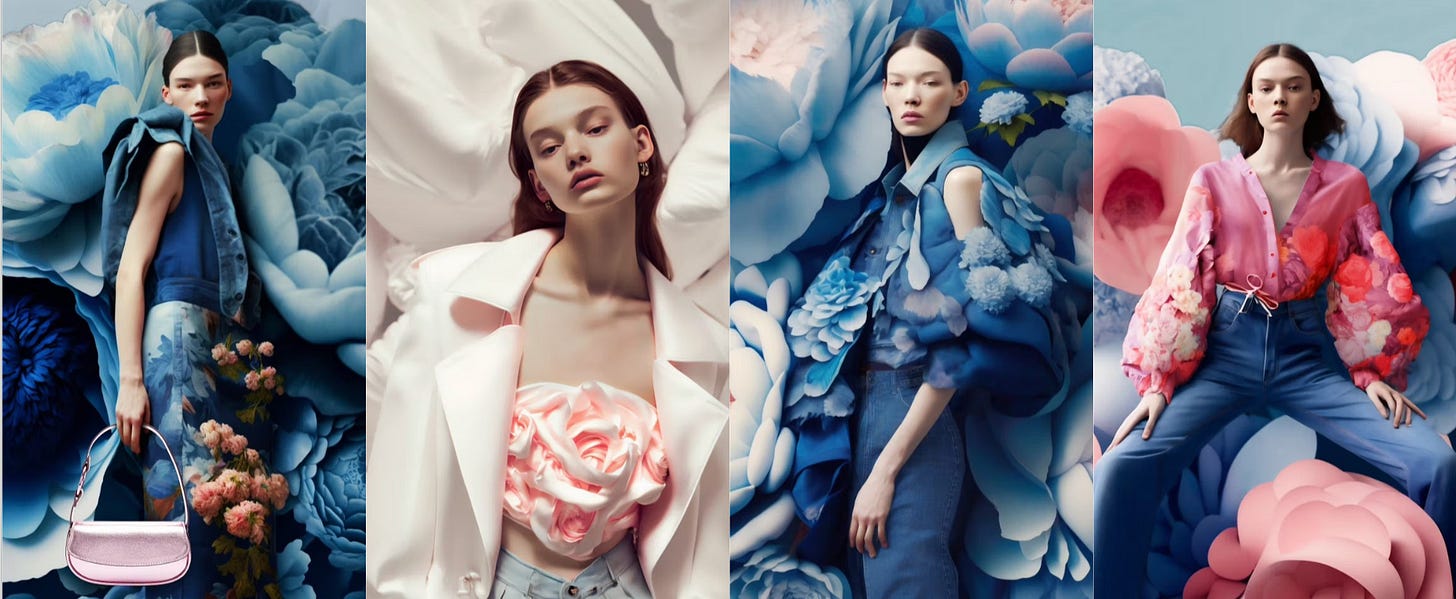
General Thoughts:
I have been a critic of artificial intelligence’s place in fashion since the very beginning. It comes as no surprise to anyone that the fashion industry has a long history of uniformity and exclusion that often overlooks racial minorities and plus size models. In recent years we saw a rise in diversity optics in the fashion industry, with one of the most public displays being Jacquemus Spring 2021 collection where the majority of models were people of color, but that did not reflect the actual design team of Jacquemus at all.
I fear that the rise of AI in fashion takes it once step further by, instead of only having (very minimal) representation in the modeling side of the industry, now replacing those career opportunities with models of color that aren’t even real.
With women only making up 26.7% of the tech workforce, and black women specifically making up only 1.7%, AI has already proven to show a great amount of racial and gender prejudices. This is a problem enough on its own, but to now present as a diverse and inclusive solution to the current exclusivity problem in the fashion industry is just like putting a band-aid on a bullet wound. There are real, plausible, inclusive ways to make the fashion industry a more diverse place and none of it requires avatars to lead the revolution.
Telfar Introduces New Live Pricing Model :
Telfar, a black-owned luxury brand known for its contemporary pricing, is further proving that statement to be true with the announcement of a new live pricing model, “TELFAR LIVE”, for their March 27th drop at 12pm EST.
This pricing plan allows the value of each item to be determined by Telfar customers. All items will be listed at the wholesale price at the time of the drop at noon (this means that some starting prices are as low as $50 USD) and for every minute that passes before an item sells out, its price will increase by one dollar. Once the item sells out (or if it stays in-stock until it reaches the retail price), the end price will remain as the retail value indefinitely.
This pricing plan is a radical response to Telfar’s dominant force in the resell market. Telfar Clemens has always advocated for an accessible business model, but that has been targeted by bots and mass resellers in recent years. His iconic Telfar Shopping Bags have a retail price of $150, but have been listed as high as $600+ on the resell market. This, of course, defeats the purpose of having an accessible brand, so Clemens is passing the authority onto his audience to set the price that is most reasonable with them.
Vera Wang Becomes the First Fashion Designer to Receive the National Medal of Arts Award :
Vera Wang received the National Medal of Art Award from President Joe Biden at the White House on Wednesday. This award is the highest medal honor given to artists in the United States and Vera Wang was the first fashion designer to ever receive it.
As someone who has dressed multiple First Ladies, was inducted to the U.S. Figure Skating Hall of Fame for her contribution to costume design, won the Council of Fashion Designers of America’s Lifetime Achievement Award, designed the uniforms for the Philadelphia Eagles Cheerleaders, and has overall been an essential part of American fashion for the past 33 years, I’d say this honor is well deserved.
I am also thrilled to see fashion being recognized as an art form of its own at the national level. Historically fashion has been undervalued, even at the institutional level with the Costume Institute being the only Metropolitan Museum curatorial department that has to fund itself, which is largely rooted in the misogynistic history of the arts. Fashion is frequently reduced to a craft since it historically presents as a female-dominant interest, so the fact that the first time this award is recognizing fashion, it is also recognizing a Chinese-American woman is very exciting news!
EU Commission Releases Proposition to Cut Down on Greenwashing :
The European Commission has released a proposition for how companies market their sustainable businesses. This proposal requires companies to meet a set of standards in order to advertise themselves as an environmentally conscious brand. This initiative is to cut down on the widespread greenwashing problem in marketing.
The Proposal for a Directive on Green Claims targets businesses that “state or imply a positive environmental impact, lesser negative impact, no impact, or improvement overtime for their products, services, or organization.” The proposal requires green claims such as “made from 30% recycled plastic” or “committed to reducing carbon footprint” to be substantiated or else there will be “effective, proportionate, and dissuasive penalties.”
Although this proposition is not exclusive to the fashion industry, greenwashing has been a large problem in fashion for many years. Between persuasive marketing like referring to microplastic-shedding textiles as “vegan leather” or disguising garment-dumping as “clothing donations to the third world,” greenwashing is not only dishonest about their environmental impacts, but their humanitarian ones as well. There needs to be a set of standards present, so these brands can morally and legally be held accountable.
The Fashion Law breaks down this initiative even further in an article I will link here and below.
Fear Of God Announces First Fashion Show :
Fear of God’s creative director Jerry Lorenzo announced his first fashion show which will take place on April 19 at The Hollywood Bowl.
This iconic venue is not only important to music history, but fashion history as well. In 1993 Calvin Klein hosted a runway show fundraiser which raised $1 million for the AIDS project that included a performance from Tina Turner.
Although not much is yet known about Lorenzo's upcoming show, between the history of the Hollywood bowl and presenting off of the fashion week schedule, all eyes are currently on him.
This year marks the 10-year anniversary of the American luxury apparel brand and earlier this month Alfred Chang, PacSun’s co-chief officer, joined Fear of God’s team as chief executive officer. In February, the brand ventured into retail with a pop-up shop in Seoul, South Korea at the Hyundai Trade Center, so all of Lorenzo’s cards are lining up to have a successful fashion show debut.
Serhat Işık and Benjamin A. Huseby Leave Trussardi :
The GmBH Designers, Serhat Işık and Benjamin A. Huseby, leave Trussardi after only two years with the brand. This sadly comes as no surprise seeing that recently the entire board of directors and CEO, Sébastien Suhl, resigned amid €50 million debt. WWD states “It is understood the goal is to restructure Trussardi for a potential sale. Three parties have expressed an interest in the company, whose employees have been put in ‘cassa integrazione,’ a government-funded redundancy pay since February that is expected to extend until the end of April.”
First Look At H&M x Mugler :
The first look at H&M x Mugler was released on March 23 through a music video that features Manfred Mugler’s original muses Jerry Hall and Connie Flemming. The collection appears to have pieces similar to Casey Cadwallader’s current Mugler as well as some callbacks to Manfred’s archive.
I wrote about my feelings for H&M x Mugler extensively a few weeks ago in my essay When Capitalism Becomes Cosplay. I still hold the same feelings after finally seeing the collection, it is exactly what I was expecting, but now I am more interested in the rise in archival callbacks and how that effects the value of vintage pieces. I addressed this a bit in my JW Anderson review for London Fashion Week and have plans to discuss it even further in an upcoming essay, but to briefly summarize:
Since fashion is class performance and the fashion industry is widely dependent on exclusivity, there has been a drastic increase in the interest of archival pieces. Because of their age, there is an even more limited supply than the initial limited supply that is embedded in the luxury fashion model, which means an item’s value is directly linked to its rarity. However, since fashion is a business, it finds capital in the interest of vintage pieces therefore many brands have been bringing archival designs back into production (see: Jean Paul Gaultier Cyber Collection).
I’m curious to see how this will hold an overall effect on the value of archival pieces. Of course, there is still value in having “the original,” but since fashion is widely based on visuals, if the lack of visual-exclusivity leads to the the dwindling interest in archive fashion, the interest in re-editions will sink with it: an ouroboros.
W Magazine Announces Chinese Edition :
W Magazine is set to release a new fashion publication in China in partnership with MC Style Media, the publishing conglomerate that oversees Marie Claire China.
The publication will be led by chief executive Alex Sun and editor-at-large Mix Wei. The first edition of the magazine will be released in April and will subsequently adhere to a bi-monthly publishing schedule. W China will also have digital content on the social media platforms Instagram, Douyin, WeChat, Xiaohongshu (RED), and Weibo.
Beyoncé and Adidas Part Ways :
After five years in collaboration, Beyoncé’s activewear brand Ivy Park and Adidas have parted ways due to creative differences. However she is reportedly planning on reclaiming sole ownership of her brand to maintain full creative freedom.
Weekly Reads:
Is Viral Fashion Meant to Be Worn? by Laura Reilly, The Cut.
“Ive Been Suffering For Years.” Law Roach on the reasons behind his retirement from celebrity fashion by Lindsay Peoples, The Cut.
The Button-Pushing Impresario of Balenciaga: How Demna engineered the rise—and near-fall—of the luxury fashion house. by Lauren Collins, The New Yorker.
The New Requirement for Landing Media Coverage by Diana Pearl, The Business of Fashion.
EU Commission Releases Proposed New Rules to Cut Down on Greenwashing by The Fashion Law.


